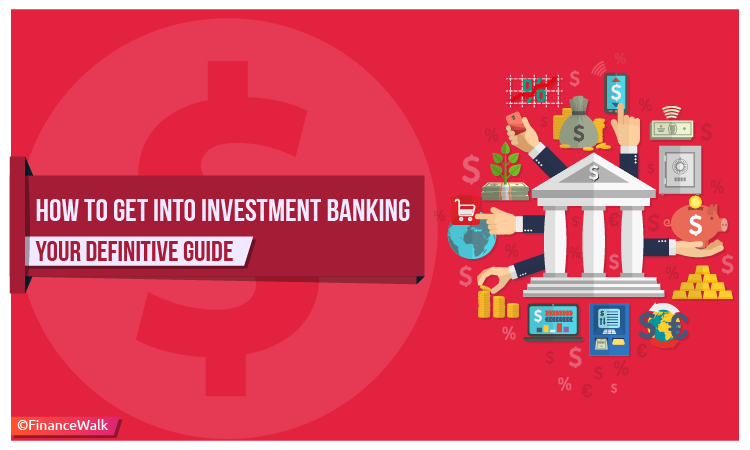The primary objective of an investment bank serves to underwrite new securities issued by its clients.
Apart from that, it also provides other services, such as mergers and acquisitions advice, private wealth management, and many types of professional help.
Investment bankers work a difficult career. You need college degrees, extracurricular activities, and determination to make the best out of a difficult job.
On top of that, it also requires dedication and being the best at what you do because the number of posts is inversely proportional to the number of applicants.
However, it’s one of the most rewarding jobs out there, not only in the finance sector but on the whole as well. It’s extremely well-paid and IS satisfying.
To help you, here is your definitive guide on how to get into investment banking or corporate finance.
Departments and tiers in an investment bank:
When applying for an investment banking job, it’s good to know right off the bat what departments there are.
Your investment banking roles, working hours, and salary will differ depending on your department. Here are what they are.
- Finance
- Investment research
- Investment banking
- Investment management
- Private Equity
- Securities and Trading
- Compliance
- Merchant banking
- Legal and management controls
- Information risk management
- Services
- Technology
- IT
- Human resources
There is also a metric used to divide investment banks among themselves, called a ‘tier.’ Building on it, there are ‘tier 1′ and ‘tier 2’ investment banks.
The distinction is usually made by how big they are.
The big banks, also called bulge bracket firms, are included in the first tier, while every other bank falls into the second category.
Here is a detailed description of the difference between bulge and boutique bracket investment banks, as provided by mergersandincquisitions.com.
In short, the Bulge Bracket is a term used to define huge banks. They are:
- Bank of America Merrill Lynch (New York City)
- Barclays (London)
- Citigroup (New York City)
- Credit Suisse (Zurich)
- Deutsche Bank (Frankfurt)
- Goldman Sachs (New York City)
- P. Morgan (New York City)
- Morgan Stanley (New York City)
- UBS (Zurich)
On specification is required here, though – tiering only applies to these types of banks, but not specialist small ones or fund managers.
Roles and jobs in an investment bank
Investment bankers and financial analyst careers are structured. As far as investment banks go, there are three departments.

a. Front Office
This is considered to be the role that generates all the revenue in a bank. It comprises two main areas:
- Investment Banking
- Markets – this one also includes sales, trading, research, and structuring.
Investment banking – since the main job of an investment bank is to give financial advice to its clients – the largest organizations in the world – and since the people that do that can be found in the front office, you can understand why it’s the most important cog in the mechanism.
It’s also the most prestigious department in any bank and the one that generates the highest salaries.
Markets are further split into the subcategories mentioned above.
Even though an average investment banker will make a lot more than an average trader, the best trader will still make a lot more than the best investment banker there is.
b. Middle office
Here you can find risk management jobs. The middle office analyses and evaluates the risks taken by the front office employees.
They do that by imposing some limits on them, such as giving them access to limited funds to trade with. It’s considered to comprise more cost-cutting roles.
c. Back office
This department includes mostly operational roles. It also houses the technology division.
The employees here do transfers daily and ensure there are no errors in all the processes.

What education is required for a job in investment banking?
As shown above, investment banking comprises a series of departments, sub-departments, roles, and positions.
Given that the roles are different, they each require a special set of technical skills and academic background.
Therefore, it’s possible to enter an investment bank as an employee following a series of studies.
Examples include Business Administration Finance and Economics, Politics, and even Geography.
Finance and Sales positions incorporate tend to accept all sorts of degrees, even Arts.
In the same way, trading and quant positions will require you to have a strong mathematical background.
This means your degree should be in Mathematics, Economics, Physics, Chemistry, Business Studies, Engineering, Accounting, and Finance.
As far as degree classifications go, all the banks usually expect you to have achieved 2.1 honors, no matter the discipline.
However, preference will be given to top-class graduates, so make sure to study hard and finish first or second.
It’s a known fact that top-tier banks hire the most outstanding individuals.
This extends to academia as well. The better you were in college, the more likely you would secure a position with one of the best banks out there.
You will need to register as a representative e of your bank with the relevant financial services industry authority or its equivalent of the Financial Industry Regulatory Authority.
Having cleared up the requirements, let’s delve further into how you can get into an investment bank as far as education goes.
Read on to see what you need to do if you have no experience, no internship, no finance degree, if you want to do it after your MBA, or if you have a degree such as engineering and you want an investment banking analyst job.
Getting into investment banking with no work experience

Getting investment banking analyst jobs without work experience is a very delicate subject in the world of investment banking.
The reason is that very few entry-level positions are available at all times in this market and that ‘no experience’ has double entendre.
As far as entry-level positions go, this is terrible news. There are less than 20 000 job openings for beginners every year globally.
This is a staggeringly low number when you also find out that there are usually ten times more applicants than jobs.
That means nine other people are competing for the job you want. Being the best suddenly makes a lot more sense in this context.
Besides, banks don’t even advertise their jobs very much out in the open.
First, the investment banking world is a somewhat closed circuit; they just don’t have to. If you get in, you get to be part of a tight-knit investment banking team.
Candidates come to them all the time in huge numbers.
Another thing is that if you’re in an entry-level position, you probably won’t get a job with one of the best banks.
As stated above, ‘no experience’ has a double entendre. Some applicants have come straight from the University.
They have studied in a related field and probably already done some internships and extracurricular activities while still in college.
And then some have no experience.
Their diplomas come from different fields and haven’t yet had any contact with this world.
The best idea here is to evaluate yourself objectively and correctly as possible and see exactly where you stand as far as ‘entry-level’ goes. This will make it a lot easier to figure out your next steps.
Here are a few tips on how to land a job in investment banking when you have no experience.
- It’s almost impossible to stress enough how important this is. You need to get to know people in the field and have them create a bridge between you and the bank. It’s a lot easier and safer than having to apply normally.
- All contact with your employer must come from your side and be done in person or via telephone.
Never expect them to call you. They don’t have to. Also, don’t simply send in your resume and wait. Go to their offices and talk to them face to face.
- Take as many courses and training as possible and then list them on your CV. They will be impressed to see that you have all the knowledge even if you don’t have actual work experience.
- Never stop learning and keep up to date. Listen to the news, follow the trade press, and read all the articles and books that appear yearly.
- Never get your inspiration from movies such as Wall Street. This is real life, and your employer will not appreciate you not knowing the difference.
- Learn financial modeling
Getting into investment banking from a non-target school
As shown above, getting a job in investment banking is possible even if you haven’t graduated from a target school.
Banks target all sorts of people depending on the department they open positions in.
That’s because some jobs in a bank require more skills than actual academic knowledge. So, what can you do to secure a job in investment without a finance diploma?
- Try to compensate for the lack of field-related academia by taking as many training courses as possible.
- ‘Pester’ firms to accept you for an internship. Keep in mind you’re not going for an internship with the biggest investment bank in the world here. Any internship at any bank, no matter how small, is great.
Your main target is to gather information and have something to show on your resume.
- ‘Bankify’ your resume. This means making it look finance related. Highlight absolutely everything you have done in this niche, all your relevant knowledge, and use the ‘business’ language.
- Stop telling yourself you have nothing to do with this field because you come from a non-target school.
This will only make you feel bad. And when you feel bad, you lack self-confidence. This is something they will immediately pick on.

Getting into investment banking with an engineering degree

As an engineering graduate who wants to break into the world of financing, the most important thing is to know that you will be in a battle for that position, who your opponents are, what their weaknesses are and what your strengths are.
You will be going against the following categories:
- Lawyers – which can work very long hours and have complete knowledge of the law system on their side
- Accountants – these are the people that know accounting and finance
- Consultants – who understand how people work and, more importantly, how the corporate world works
- Liberal arts majors‘ main strength is their ability to communicate and work with people.
But one major thing you need to bank on as a person with an engineering background is that none of these people can do math and numbers as well as you do.
Therefore, when building your resume and applying for a job in an investment bank, stop focusing on the word ‘engineer’ and start focusing on what it represents. And that’s a person who can crunch numbers like no one else.
Remember, your main challenge is your communication skills. Unfortunately, the world runs on the misconception that individuals who are good with numbers aren’t good with people and the other way around.
At the interview, make sure you show them you have real communication skills.
Getting into investment banking without an internship
Do you have a shot at a job in an investment bank if you didn’t go through an internship? Yes, you do.
You must understand from the beginning that you will have a harder time than your fellow applicants.
That’s because they have college degrees, internships, and training to back them up; they’re considered a safer investment.
It’s not impossible for you. Here are a few things you can do to up your chances and secure a job.
- Spend as much time as possible researching on your own. When at the interview, based on this research, show them exactly why you want the job, what you like about the field and why you haven’t done any internships so far.
- Even though you haven’t studied it or done an internship, you still need to know a good deal about the financial world. Studying is key here.
Read as many articles and books as you can.
- Interviews must become a strong point. Seeing as, unlike your fellow candidates, you have no experience or studies in the field, you have to ace the interview.
You need to put more effort into it than they will. Use it as the trick-up-the-sleeve, which will get you the job.
Also, ensure you get noticed during the interview by adding a bit of an edge to your answers.
- Instead of seeing your non-finance experience as a drawback, use it as a strength.
For example, if you used to work as a salesperson, then that means you have excellent people skills.
If you’re an engineer, you know math. Everything you do in your professional life can be used to your advantage.
- If you come from a certain sector, like pharmaceutical, chemical, marketing, or what have you, you can stress this.
Tell them that, thanks to your experience, you now have an in-depth understanding of these fields in which you would like to continue working.
Being specialized in these fields gives you a clear advantage over candidates with a finance degree. Unlike you, they have only done finance.
Getting into investment banking after your MBA
Another interesting question about the finance world is – will an MBA get you into investment banking? The answer is it will help, but it’s not a golden ticket to it.
This means that you cannot and should not rely solely on your MBA degree. But it does help you a lot, and here’s how you can use it.
- Bank on the idea that having an MBA from a top program will give you leverage as well as a lot more credibility with your employers.
- Attending a top college will give you easier access to people in the industry. Remember, networking is key in investment banking. The earlier you can start building your financial network, the better.
- Sometimes, banks recruit right off the campus. For this, you must ensure you stay on top of your class.
- Choose your school carefully because only a few are selected as investment banks’ targets. Here are a few examples of top schools where you can get your MBA, as ranked by com.
- Columbia Business School
- University of Pennsylvania: Wharton
- London Business School
- Cornell University
- INSEAD
- Harvard Business School
- New York University: Stern
- HEC Paris
- Stanford Graduate School of Business
- Yale School of Management
Getting into a top-tiered bank – Goldman Sachs

After detailing all aspects of education needed to secure a job in an investment job, here are a few pointers on top of that.
They regard getting into a top-tiered bank, and the example we’ve chosen is Goldman Sachs.
- As it’s one of the world’s most prestigious and successful investment banks, they usually require a degree from an Ivy League, ‘red brick,’ or Grande Ecoletype of school.
This is why you need one to accept you as a student.
- Understand that it’s not sufficient just to get there and get a diploma. You have to be among the best to get noticed by the likes of Goldman Sachs.
They can and do afford to be picky when they have ten people competing for a single position.
- You need to become a well-rounded and adjusted person. This means that knowing your finance isn’t enough for them.
They will also look at your personal life and usually go for people who, besides work, play sports, are part of a band, do theatre, have taken wine classes, courses about French impressionism, or what have you.
- When you go to Goldman Sachs, they want to see you are engaging, not shy of fascinating.
The reason is their clients. Goldman Sachs manages some of the biggest companies in the world.
This means the actual clients are some of the wealthiest and most famous people on the planet.
Goldman Sachs wants to ensure they send in a person who can handle that level of conversation and social interaction.
- Find yourself a mentor. This can mean anyone, from a family member to a friend or a professor, as long as they have been successful in business and finance.
Call them up all the time and ask all the questions you want. Look for guidance and advice because getting a position at Goldman Sachs will be one the most difficult things you will have to do in your investment banking career.
- Apart from that, they can also introduce you to people who work at Goldman Sachs, and here is how you get your entrance ticket.
As you can well see, investment banking is a fascinating field to work in.
It will give you a chance to study, work hard, earn a lot of money, travel, and meet many interesting people. It’s no wonder getting in is rather tricky!

















